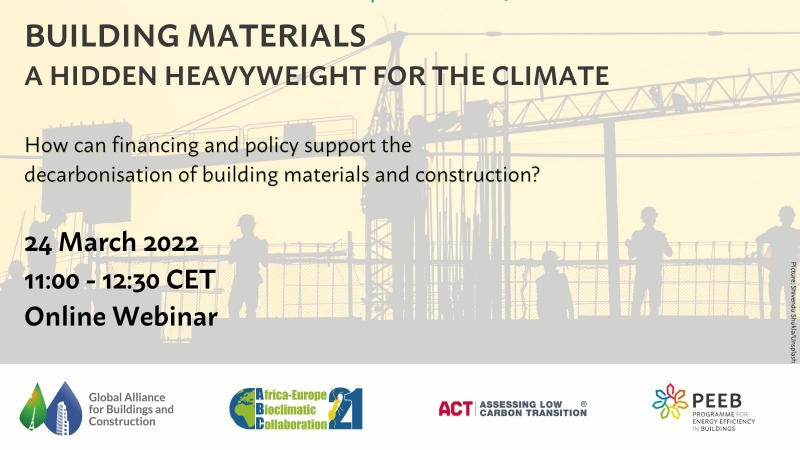Production of building materials and construction activity are responsible for 10% of all energy-related greenhouse gas emissions globally. With the global floor area expected to double by 2060, there is an urgent need to address the issue of embodied carbon in buildings.
PEEB, GlobalABC, ABC21, and the ACT Initiative co-organised a webinar on building materials on 24 March 2022 to bring together experts from academia, industry and policy to discuss the challenges currently faced by this sector as well as the potential solutions for them.
The strategies to reduce embodied carbon exist – from building smarter to decarbonising building materials. To shine a light on these solutions, the Programme for Energy Efficiency in Buildings (PEEB) has recently published a Working Paper presenting the key facts on embodied carbon, as well as practical strategies to reduce it.
These strategies to reduce the carbon footprint of the construction sector were discussed, from resource efficiency and circular economy approaches to using alternative building materials and decarbonising the conventional ones. Many of these solutions already exist and are being implemented, but they are lacking in scale. Dedicated policies and financing support are needed to create a business environment that can tackle embodied carbon.
Chitra Vishwanath, architect and founder of Biome Solutions highlighted the massive growth in construction foreseen in the developing world while Asmae Khaldoun of Al Akhawayn University brought the potential of bio-based materials for construction to the fore. ACT Initiative’s Marlène Dresch underlined the urgency of transforming the production processes of building materials to avoid high-carbon lock-in, stating that “decisions taken now will shape the production routes in 2050”. Anupam Badola from Dalmia Cement in India underlined the high share of construction demand from the public sector, where green procurement protocols and policies can create market demand for improved cement and steel.
Reducing the energy use and greenhouse gas emissions caused by the way we construct is critical, and embodied carbon in buildings must be high on the agendas of policy-makers, companies and practitioners globally. In 2022, Global Alliance for Buildings and Construction will bring building materials and embodied carbon high on the agenda, highlighting the issue through advocacy and research. Several members of the Alliance are working with development banks and investors to increase investments in buildings that address whole-life carbon.
Links to the webinar recording are speaker presentations are available online.
By viewing the video, you agree that your data will be transmitted to YouTube and that you have read the privacy policy.


 more
more